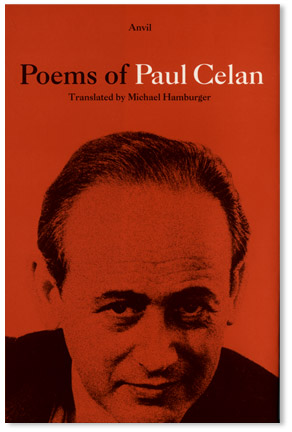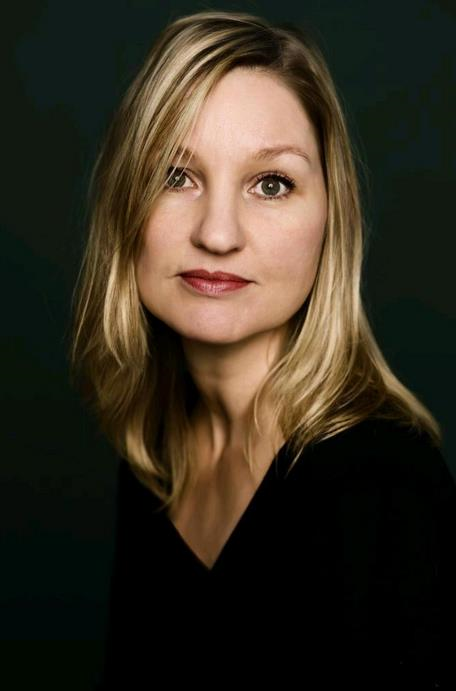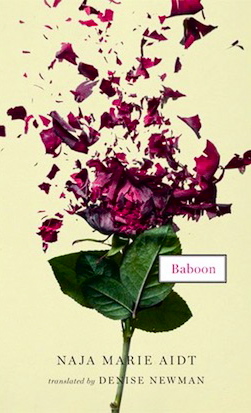Note: Danish author Naja Marie Aidt, who was born in Greenland and spent her early years there, was WINNER of both the Nordic Council’s Literature Prize and the Danish Critics Prize for Literature in 2008 for her story collection, Baboon.
“People have got to stop their navel-gazing bullshit and write real stories. What the hell is wrong with fiction? The idea that it’s truer and more real to write about yourself is nothing but the unreflective extension of individualism and the childish self-centeredness of our stunted generation. We’ve let ourselves be stunted. There’s no will, no rebellion, or idealism in us. No solidarity. And now, apparently, we feel the need to spew our self-absorbed, narcissistic self-pity over literature as well. It’s enough to make you vomit.”
Th e literary arguments expressed above by Jules, a friend of the main character here, certainly do not apply to this novel – well-developed fiction with a beginning, middle, and end; imagined characters who let us into their lives without making us feel that they are confessing the author’s own hidden secrets; and new renderings of broad, universal themes which have pervaded literature from its beginnings. The personality of Thomas O’Mally Lindstrom, the main character, was forged in his dysfunctional childhood with an abusive father and an absent mother, and he has never fully resolved many issues. As he deals with the uncertainties of his current adult life, he reveals his inner thoughts, and though some unkind readers might think of his confessions as “navel-gazing,” they are the recollections of a self-absorbed main character as he tells his story, and not the hidden memories of an author. Author Naja Marie Aidt, in fact, has made a bold move here in choosing a male to be her main character: her female characters, some with backgrounds similar to that of Thomas, are often stronger and more resilient than the males.
e literary arguments expressed above by Jules, a friend of the main character here, certainly do not apply to this novel – well-developed fiction with a beginning, middle, and end; imagined characters who let us into their lives without making us feel that they are confessing the author’s own hidden secrets; and new renderings of broad, universal themes which have pervaded literature from its beginnings. The personality of Thomas O’Mally Lindstrom, the main character, was forged in his dysfunctional childhood with an abusive father and an absent mother, and he has never fully resolved many issues. As he deals with the uncertainties of his current adult life, he reveals his inner thoughts, and though some unkind readers might think of his confessions as “navel-gazing,” they are the recollections of a self-absorbed main character as he tells his story, and not the hidden memories of an author. Author Naja Marie Aidt, in fact, has made a bold move here in choosing a male to be her main character: her female characters, some with backgrounds similar to that of Thomas, are often stronger and more resilient than the males.
With a title which recalls a children’s game which is used to make choices, Rock, Paper, Scissors is filled with the interactions of people who have faced hard times and have somehow survived. The novel opens with Thomas and his sister Jenny dealing with the death of their father in a jail cell where he has been awaiting trial on some unknown charge which would have brought a long jail sentence. When they later go to their father’s apartment, neither of them wants anything as a memento, but Jenny decides to take his toaster, simply because hers is broken and she has very little money to buy a new one. Later, when the toaster does not work, Thomas takes it apart for her and finds something surprising inside. Throughout these beginning pages, the novel moves back and forth in time as Thomas, forced to think about his estranged father, obsesses about death – that of his father, of family members, and even of the unknown people he sees in the supermarket – and it is through this introspection that many of the details about his family background are revealed.
Now financially comfortable, Thomas is ego-driven, impatient, and calculating, and his insistence that he does not want to have children has driven a wedge between him and Patricia, his long-time love. At times, especially when he is drunk, he has visions and feels threatened, and occasionally his shockingly violent thoughts rise to the surface and take over. When Thomas’s stationery shop is ransacked and trashed, shortly after his visit to his father’s apartment, the mysteries begin and Thomas becomes more fully developed, though not more admirable. A new character, Luc/Luke, who was mentored by Thomas’s father, adds to the mysteries and the complications as Luke ingratiates himself with the family and with Thomas’s acquaintances. Eventually, one of the novel’s female characters is assaulted, and another receives a strange, anonymous message, just five words long. Thomas becomes convinced all these events originate with whoever destroyed his shop.

Celan, popular among the literati with whom Thomas associates, was also a favorite of Thomas’s father, Jacques.
As compelling as the plot and Thomas’s psychology may be, the novel’s philosophical underpinnings and the universal themes which emerge from the conflicts are even more provocative. Underlying the entire novel are questions of who we are as human beings, how much our futures as individuals evolve from our own actions and choices, and how much damage can be inflicted upon us by others around us. Other events draw us in by mere chance, as we see in the random events which involve Thomas as he deals (or does not deal) with his own life and the people surrounding him. At a critical point in the novel, Thomas’s long-time lover Patricia, his sister Jennie and her daughter Alice, Luc/Luke who was close to Thomas’s abusive father, and two of Thomas’s aunts, all meet to spend a weekend in the countryside together. During this weekend, and on an earlier occasion, in which Thomas and Patricia spent an evening with friends, the great importance of literature in the lives of these characters is stressed, further emphasizing the idea of the imagined life vs reality. Celan, a favorite poet of Thomas’s father Jacques, is also a favorite of others here, and his work is featured at both of these get-togethers involving Thomas.

When Thomas’s extended family meets in the countryside, they do so at his aunt’s sheep farm near one of the highest points in Denmark.
A quotation from a poem recited by Thomas, Celan’s “Fugue of Death,” a bleak work about Germany and the fate of the Jews, is startling in its premonitions and adds to the haunting atmosphere: “Black milk of daybreak we drink it at sundown / we drink it at noon in the morning we drink it at night / we drink and we drink it / we dig a grave in the breezes there one lies unconfined….” As the novel progresses, the imagery and premonitions of death increase: Even in the scene in which the family is reciting poetry and drinking, they are drinking tequila (presumably the mescal variety) with a dead, alcohol-soaked worm sloshing in the bottom of the bottle.
Filled with smart, crisp language; carefully described and introduced imagery; and occasionally lyrical passages, the novel owes much of its appeal in English to translator K. E. Semmel, who must have been challenged by the metaphysical aspects which parallel the narrative lines. With contrasting themes of life and death, love and hate, accident and design, strength and weakness, selfishness and altruism, and reality and invention, the novel offers much to ponder on many levels. Ultimately, one is even forced to consider the question of whether the existence of an alterego is real or a protective fiction created by a damaged ego.
Photos, in order: The author’s photo is from http://britishlibrary.typepad.co.uk/
The cover of Baboon, which won both the Nordic Council’s Literature Prize and the Danish Critis Prizde for Literature in 2008. http://www.asymptotejournal.com
Celan’s poetry collection is from http://www.junglekey.co.uk
One of the highest places in Denmark is where Thomas and his family meet on a sheep farm for a long weekend of discussing literature and life itself: http://www.summitpost.org/
ARC: Open Letter Books


